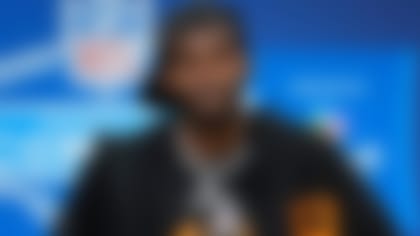ENGLEWOOD, Colo. -- Denver Broncos wide receiver Kenny McKinley, who is believed to have killed himself with a gunshot to the head, had made previous statements about committing suicide, according to a sheriff's investigative report released Tuesday.
The Arapahoe County Sheriff's report quoted one investigator as saying McKinley had been depressed over a knee surgery he had a month ago.
"He had made statements while playing dominoes shortly after the surgery that he should just kill himself," the officer reported. "No one believed he was serious."
The report didn't provide an explanation for the source of the investigator's information.
The report also said McKinley had made statements about not knowing what he would do without football. It said McKinley had flown to South Carolina 10 days earlier to see his 1-year-old son, Keon, and had brought him back with him to Denver on Sunday night.
Two female friends who were taking care of his son discovered McKinley's body Monday and called 911. Detectives who responded to his home a few miles from the Broncos headquarters found McKinley's body with a pillow over his head and a semiautomatic pistol on top of the pillow. They also noted a strong odor of freshly burned marijuana, according to the report.
The officers said NFL Network was on the television in the bedroom.
The report also said McKinley was taking 500 mg naproxen tablets, which is in a class of anti-inflammatories called NSAIDS, but listed no other medications.
Arapahoe County Coroner Michael Dobersen said Tuesday that McKinley died of a gunshot wound to the head. He said a preliminary investigation "suggests the wound to be self-inflicted."
Brittany Boyd -- the wife of former Broncos running back Cory Boyd, who was McKinley's best friend and college teammate -- was one of the two women who were taking care of McKinley's toddler son when they discovered the receiver had shot himself.
Boyd told The Associated Press she didn't know who told the investigators that McKinley had mentioned suicide -- "That wasn't from us," she said -- but added that she wouldn't be surprised if nobody would have taken such a threat seriously.
"If it had been said to me, I probably would have been like, 'Yeah, whatever, Kenny.' It would have completely gone over my head," she said. "That's not the type of thing he would say, and if he did say it, that's not the type of thing that you would take seriously coming from him.
"Because of his personality, because of who he is, nobody would have ever believed he would have done it."
Boyd, who lives in Denver, said she flew to Columbia, S.C., on Tuesday to take McKinley's son, Keon, who is almost 2, back to the boy's mother, Shayla Lites.
Boyd said she had picked up McKinley and his son at the Denver airport Sunday night, and nothing seemed amiss.
NFLPA fund for McKinley's son
The NFL Players Association has established the Kenny McKinley Trust Fund, which will provide future educational and health-care expenses for the late receiver's 1-year-old son, Keon. The NFLPA has made a donation to the fund and is soliciting contributions from all players and the public.
Contributions benefiting McKinley's son can be sent to:
Kenny McKinley's Trust Fund
c/o NFL Players Association
1133 20th Street NW
Washington, D.C. 20036
"He was just excited about having his son here," Boyd said. "He showed no signs of depression, no signs of awkwardness. He was 100 percent himself. He was 100 percent Kenny, laughing and joking, playing. And he was absolutely normal, he was fine."
Boyd did say, however, that she could tell over the last month that McKinley was having a hard time with not being able to play football or be around his teammates every day. But she said it wasn't like he was struggling to the point that anyone feared he would harm himself.
Boyd said neither she nor her friend who was helping take care of the boy knew McKinley had a gun.
"We had no idea," she said. "Nobody knew."
McKinley's teammates and coaches said Tuesday that they didn't see any hint the gregarious 23-year-old wide receiver was suicidal. Neither did the players at McKinley's alma mater, South Carolina, when he visited them earlier this month.
"I actually saw Kenny a week and a half ago. He was over here picking up some stuff out of his locker," Broncos linebacker Wesley Woodyard said. "He was always a guy that used to love to joke with me, and I would joke back and forth with him. But he had a big smile on his face. He just walked out of the building.
"And that's the last thing we remember, that huge smile. Like coach said, he always showed every tooth in his mouth, just smiling and being happy."
This is the third time in four years the Broncos have had to deal with the death of a teammate under stunning circumstances. Cornerback Darrent Williams, 24, was slain in a drive-by shooting on New Year's Day 2007. Three months later, running back Damien Nash, 24, collapsed and died after a charity basketball game in St. Louis.
Broncos coach Josh McDaniels said in a tearful news conference Tuesday that nobody with the Broncos sensed any warning signs from McKinley about his state of mind.
"We've all seen him recently. He's been the same person every time we see him. Liked junk food and chips and things like that," McDaniels said. "He was in the cafeteria, or in the training room, when we were seeing him the last so many weeks here. Nothing that would alarm us to anything like this."
Woodyard said McKinley was his usual joking and jovial self in recent weeks even as he was recovering from his second knee operation this year.
"Every memory that we have of Kenny is a joke and a big smile," Woodyard said.
Woodyard said despite what it might look like to fans, NFL players have lots of pressures in their lives even though they're living the dream.
"Well, you know, football's a stressful job," he said, adding that players have to reach out for help. "It's the same thing with people in everyday life, you've got to talk to somebody in your life, so just to help you work out those problems."
McKinley was a fifth-round draft pick out of South Carolina in 2009. He remains the Gamecocks' all-time leading receiver with 207 catches for 2,781 yards. He returned to the school earlier this month, watching South Carolina beat Georgia, 17-6, and visiting with his college coach, Steve Spurrier.
None of McKinley's old friends in Columbia, S.C., sensed anything was wrong.
"No, all of our players said the same thing. When he was here, he was happy, smiling, the usual Kenny," Spurrier said. "In fact, I think he watched the Georgia game from up in my office there (in Williams-Brice Stadium) because he was on crutches from his knee surgery. I saw him up there right after the game. He was his usual self. It's hard to comprehend how that can happen."
People who are dealing with depression or suicidal thoughts aren't always outwardly despondent, said Dr. Michael Allen, director of research at the University of Colorado Denver's Depression Center. He said suicidal individuals don't always reach out for help, even to those closest to them.
"Warning signs depend on the run-up," Allen said, adding that suicidal people who have been depressed and thinking about killing themselves for weeks might sometimes reach out or have trouble keeping a happy face to cover up their feelings.
"For many people in the mild to moderate range, you wouldn't know they're depressed," Allen said. "They're able to put up a good front of joviality."
Allen, who wasn't specifically addressing McKinley's death, said reaching out can be difficult for those in the military or on sports teams: "In any group of men where toughness is valued, talking about anything that may be viewed as weakness goes against the grain."
The Broncos gathered Tuesday morning on their normal day off and met with grief counselors to help them deal with the death of their friend, who was on injured reserve after hurting his left knee in August.
"We prayed for his family and him," McDaniels said.
The players decided to leave McKinley's locker in place for the remainder of the season as a shrine to their teammate.
There also will be a moment of silence Sunday before the Broncos' game against the Indianapolis Colts, and Denver players will wear white decals with McKinley's No. 11 in navy on their helmets.
McDaniels said there's no way to make this a normal work week in preparing for the Colts, suggesting every player and coach will grieve in their own way.
"We've got to play with him on our shoulders and in our hearts," Woodyard said.
News of McKinley's suicide touched players across the NFL.
"Kenny was such a good guy, such a fun guy to be around," said Minnesota Vikings receiver Sidney Rice, a college teammate of McKinley's. "He was a happy guy who had a great sense of humor, and he's going to be missed by so many people. He was funny and always kept people around him upbeat. I'm shocked he's gone."
McKinley played in eight games as a rookie in 2009, and he had seven kickoff returns for 158 yards before going on injured reserve with a left knee injury on Dec. 29. He recovered and participated in the team's offseason workouts, but he was hurt again during the first week of training camp and was placed on IR on Aug. 5.
McDaniels said McKinley took the news well when he went on IR again, ending his season.
"It was really a decision that we made together," the coach said. "He knew the extent of his injury. It was really a choice he was very involved in.
"There's situations where you could try to do something else, fight through it and all that, or you could try to have the operation and then go ahead and be ready to go for the next year. That's what we chose together. He was very much a part of that decision. He was working hard with his rehab."
McKinley's agent, Andrew Bondarowicz, said family and friends are at a loss to explain the death of a young man "who had such a love for life." He said everyone has their theories, whether it was injuries, finances or something else.
"There's nothing that we can point to and say, you know what, that's the sign that something was wrong or that he was struggling," Bondarowicz said. "At the end of the day, he was still an NFL player. Even the theories of financial difficulties, it was not like he was cut from the roster. You still get paid on injured reserve."
McKinley signed a four-year deal worth just under $2 million last year after the Broncos selected him in the fifth round of the draft. The deal included a $200,000 signing bonus and a $310,000 rookie salary. He was making $395,000 this season although he was hurt.
Travis Shelton, a rookie receiver with McKinley in Denver before he was waived, said he had spoken with his friend by phone earlier this month and that McKinley was looking on the bright side of being out for the season.
"He was telling me he got time to spend with his son," Shelton said.
Copyright 2010 by The Associated Press



